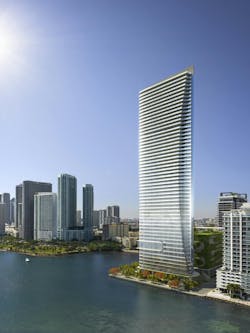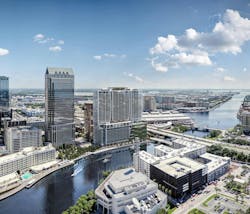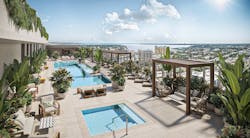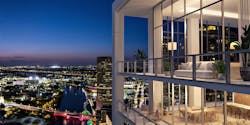Hotels extend market reach with branded multifamily residences
By John Caulfield, Senior Editor
The line separating hospitality and residential living keeps getting thinner. Multifamily developers are attracting renters and owners to their properties with hotel-like amenities and services. Post-COVID, more business travelers are building in extra days to their trips for leisure. Buildings that mix hotel rooms with for-sale or rental apartments are increasingly common.
The estimated value of “blended travel” reached nearly $500 billion in 2022, according to Future Market Insights and the Global Business Travel Association. Luxury hotel chains like Four Seasons, Waldorf Astoria, and Mandarin Oriental now operate branded private residences in several metros. Last November, Marriott International, the world’s largest hotel chain, launched a new extended-stay brand, The Apartments by Marriott Bonvoy, the hotelier’s first foray into that luxury arena in the U.S. and Canada. The apartments offer one or three bedrooms, with a full kitchen, in-unit laundry appliances, and weekly housekeeping services.
That brand extension puts Marriott more directly into competition with Placemakr, the flexible-use multifamily and hospitality property operator and investor. Last May, Placemakr initiated its first luxury condo-hotel project in partnership with CA South Development, a Nashville-based developer. Placemakr will act as both property manager and hospitality operator for Hyve, CA South’s midrise condo development in Nashville’s Pietown neighborhood that offers 83 short-term rental-eligible units, meaning that condo owners can Airbnb their homes when not using them.
The Wall Street Journal last May quoted Savills PLC, the global property advisor and agent, which estimated that from 2010 there’d been an increase of branded residences to 38,900 units across more than 200 developments in the U.S. A Savills director, Rico Picenoni, told the Journal that 80% of branded residences are affiliated, and often collocated with, a hotel.
Taking condos to a higher level
Two Roads Development, based in West Palm Beach, Fla., is among the firms circling this commercial-residential property subsector for opportunities, says Brad Meltzer, its Partner and President. Meltzer joined Two Roads Development a year ago from Plaza Construction, where he was chairman and CEO, and had worked with Two Roads to build several luxury condo projects that included the 52-story 391-unit Biscayne Beach in Miami.
Meltzer says that Two Roads got interested in branded residences as a way of “taking high-end condos to the next level.” These projects, he explains, have a “hospitality flavor” that’s “almost like living in a hotel” with deluxe amenities and guest-like services.
To date, Two Roads has successfully launched three branded residential projects:
•EDITION Residences in Miami, a 600-ft-tall, 58-story tower with 185 condos. EDITION is a Marriott brand, and this will be its first tower in Florida that’s condos-only. Arquitectonica is the architect. The project requires the demolition of an existing building and should be completed in four years, says Meltzer.
•Pendry Residences in Tampa Bay, a 38-story tower with 207 luxury condos and a 220-key five-star hotel, that’s scheduled for completion in 2027. Pendry is the hotel banner for Montage International, and Tampa is the latest of several cities to land Pendry-branded residences, including West Hollywood, Calif., Park City, Utah, and Somerset County, N.J. Toronto-based Studio Munge is the interior designer for the EDITION and Pendry projects.
•Meltzer also confirms that Two Roads is part of the development team that includes Four Seasons Hotels & Resorts, Luxus Development, and Azure Resorts & Hotels on a $1 billion branded condominium project in Henderson, Nev., called Four Seasons Private Residences Las Vegas, with 171 condos in two towers and six standalone villas. “This has the potential to be North America’s flagship project for us given its profile,” Paul White, senior vice president of residential development of Four Seasons Hotels and Resorts, told the Las Vegas Review-Journal newspaper last May.
Vertical construction was set to begin next month, within completion scheduled for early 2026.
Interest in branded residences expands
Meltzer says that branded residential projects require “another level of coordination” because, he explains, each hotel brand has its own standards when it comes to such things as design criteria and even staff training. On the other hand, many of the hotel brands his firm deals with are international, and bring with them “a great value added to the table,” says Meltzer, in terms of new ideas for design, construction, customer service, and operations.
Indeed, Two Roads Development wants to pursue more branded residential projects, both domestic and in other countries. Meltzer didn’t sound overly concerned that the branded residence trend might cool because of contentiousness between some hotel and condo owners.
The Real Deal recently reported on a lawsuit between condo owners at the 580-unit Carillon Miami Wellness Resort in Miami Beach, Fla., and Z Capital Group, which has owned the hotel and the amenities in that complex since 2015. At issue was how much control Z Capital could exert on condo owners over such things as maintenance and amenities assessments, and common areas. Last January, a Miami judge sided with the condo owners and wrote that Z Capital’s level of control amounted to “overreach.” As of mid-June, the court had yet to specify what portions of the Carillon condo owners can control. But The Real Deal noted that this wasn’t the only lawsuit pitting condo and hotel owners over control of properties and fees levied.
Meltzer suggests such disagreements were unlikely to sour hotel operators or developers on the branded residences. After all, he notes, the trend has picked up steam despite increases in construction insurance premiums, interest rates, and the cost of labor and materials.





